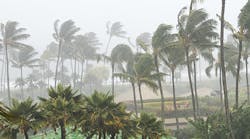Governor Ron DeSantis of Florida has declared a state of emergency for his state, due to the approach of Hurricane Dorian, but the American Logistics Aid Network (ALAN) was actually a step ahead of him. ALAN has activated a Hurricane Dorian Micro-site, where the humanitarian organization will be posting requests for assistance and links to helpful community resources.
ALAN is urging residents of Florida, the Gulf Coast and other parts of the Southeast to start preparing and advising the logistics community to get ready to help.
“The strength and path projections for Dorian are still very uncertain, but do suggest that it could be a destructive and dangerous event for Florida and potentially all of the Southeast and Gulf Coast,” says Kathy Fulton, ALAN’s Executive Director. “As a result, ALAN is officially mobilizing and gearing up to provide donated space, trucking, services and equipment as needed.”
In addition, it has issued an official “STORM” advisory that provides several do’s and don’ts for safe and efficient disaster preparation and relief (see below).
As always, Fulton says that ALAN hopes these measures will prove to be merely precautionary.
“During our 14 years of operation, we’ve seen some potentially catastrophic hurricanes that have turned into relatively minor events while others have morphed into far more major events than originally anticipated,” she says. “Obviously, we hope Dorian will turn out to be the former. However, if it isn’t, we want people to remember that we are here to assist, and that when it comes to these storms, there’s no such thing as too ready.”
STORM Advisory
Stay safe. If you and your business facilities are located anywhere near Dorian’s projected path, be sure to monitor your local National Weather Service forecast for real-time details. Just as important, please heed any warnings or advisories that pertain to you or your personnel—and allow plenty of time for your employees to evacuate or make preparations to shelter in place. Dorian is expected to turn into a major hurricane that could produce everything from strong winds and heavy rains to a damaging storm surge, and it is not to be taken lightly.
Treat every storm (including this one) like it might be the big one—even if previous storms have seemed to be “much ado about nothing.” Each time an area successfully dodges a major tropical storm or hurricane, it increases the risk that local residents won’t take future warnings about hurricanes quite as seriously. Please don’t buy into this attitude. Each storm truly is unique, and just because you haven’t been impacted in a big way yet, there’s no guarantee that you’ll continue to be that fortunate moving forward. Always heed the warnings for your area—and don’t ever assume those warnings are exaggerated. Your life and safety could depend on it.
Offer any logistics space, equipment or services you might be willing to donate at https://www.alanaid.org/how-to-help/. Although logistics professionals may not have the medical skills of first responders, they have many skills and assets that can be equally applicable after disasters hit—because when bad things happen, one of the hardest parts of humanitarian organizations’ jobs is getting items like food and hydration to disaster sites as quickly as possible. In fact, logistics accounts for up to 80% of their disaster budgets, and as much as 40% of that is wasted. That’s a lot of cost and considerable opportunity for the logistics community to be of use.
Resist the urge to self-deploy or to participate in product collection drives. Although the intention behind these drives is good, they often create more challenges than they solve, including adding more products to a supply chain that is already under tremendous strain. The same holds true for just packing up a truck and heading down to a disaster-impacted area, because that could get in the way of first responders who are working to save lives. If you’re looking for a tangible way to engage your employees in hurricane relief, pick a humanitarian organization and collect money for it instead. Such donations will be much more useful and efficient. And unlike many post-disaster product donations (which often end up in landfills), they will not go to waste.
Make frequent visits to ALAN’s micro-site at https://www.alanaid.org/operations/. During disasters, it serves as the centerpiece of their active relief efforts. Among other things, it includes a wide variety of links and resources to keep you in the loop. Just as important, it provides the latest details about what ALAN is doing, and how you can help.
